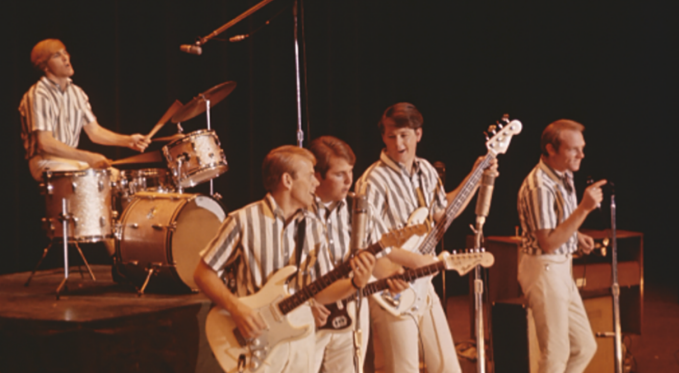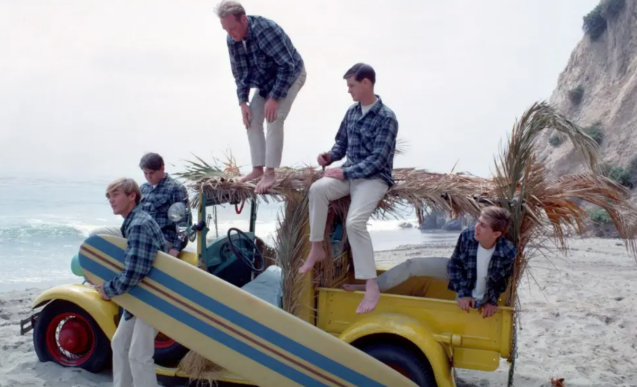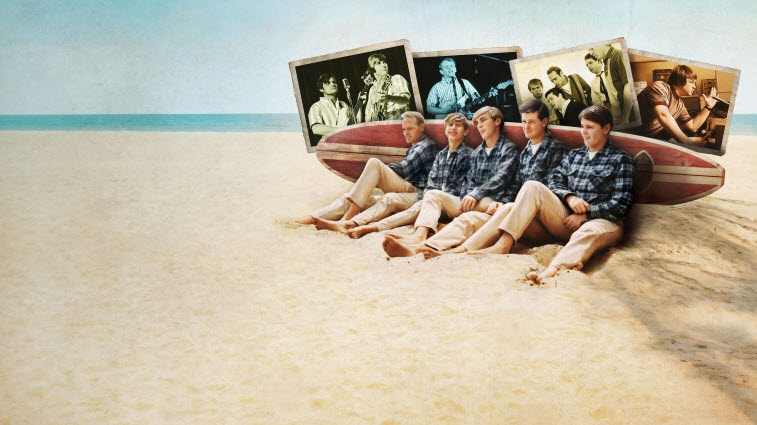Documentary film “The Beach Boys”, which was released on Disney+ on two days ago, looks over the history of the Beach Boys, one of the legendary American bands during the 1960s. While it is fairly informative to anyone not so familiar with the Beach Boys (Full Disclosure: I am one of such persons), the documentary often feels like merely parading one fact and another without providing enough insight and perspective on its main subject, and this seriously flaw is not even compensated by the timeless quality of many notable songs of the Beach Boys.
Mainly revolving around the new interview clips from several surviving members of the Beach Boys, the documentary starts with how their band got started in 1961. Even they were very young at that time, Bryan Wilson and his two brothers Carl and Dennis already showed considerable interest and talent in music as growing up under their parents who were respectively associated with the American pop music industry, and they and their cousin Mike Love often hanged around with each other as enjoying composing and playing music together. They eventually became determined to take a chance with their musical talent under the support and encouragement of Bryan and his brothers’ parents, and they and a friend of theirs, Al Jardine, came to present themselves as the Beach Boys, though they did not like their band name that much just because it sounded rather corny to them.
Nevertheless, once their band succeeded in drawing more attention with their several early songs such as “Surfin’ U.S.A.”, the rest was the history. During next few years, the Beach Boys swiftly rose to the top of the American Pop industry, and the documentary examines a bit on how the sunny and cheerful Californian spirit in many of their hit songs resonated a lot with the youthful and optimistic mood inside the American society during the early 1960s. With Bryan and Mike respectively functioning as the main composer and lyricist of the band, the band kept going up and up, and it surely looked like the sky was the only limit for them.
However, the members of the Beach Boys soon came to face the necessity of change and maturation around the middle of the 1960s. As not only US but also the whole world were swept with the immense enthusiasm toward the Beatles, Bryan and other members of the Beach Boys certainly felt much more pressured than before, and their subsequent attempts for more change and innovation often caused the clashes between the Wilson brothers and their father, who eventually became a major obstacle to confront as their domineering manager/producer. As all of the Wilson brothers admit, their father was frequently not only demanding but also quite abusive to them, and this might be one of the contributing factors to Bryan’s subsequent mental illness problem.
Anyway, Bryan and his band members kept things rolling for them during next several years. Quite impressed by Phil Spector’s ground-breaking album producing method, Bryan decided to produce a new album in his own way, and he eventually became more focused on album recording after having a big incident of mental breakdown due to the demanding tour schedule of the band. Although his resulting albums including “Pet Sounds” were relatively less successful, his undeniable musical genius was recognized much more than before, and that made the Beach Boys look and sound cool enough to compete with the Beatles for a while.
However, things quickly changed for the boys around the late 1960s, where American pop music became more rebellious as the American society went through a rocky period of social/political turbulence after the beginning of the Vietnam War. The music of the Beach Boys came to be regarded as old-fashioned as a result, and Bryan and his brothers felt hurt more when their father casually sold all the copyrights of their old hit songs.
In addition, the Beach Boys also unfortunately got involved with one of the most notorious incidents during the late 1960s. Around that time, Dennis, who happened to be the wildest one in the bunch, got himself associated with a certain infamous figure who was quite interested in becoming a successful pop musician someday. Dennis willingly introduced this figure to the producer of his band, but the producer understandably avoided this figure, and that eventually led to the aforementioned incident, which was virtually the death knell for the liberal social/political mood in US during the 1960s.
All these and other things in the documentary may satisfy you enough, and I will not deny that I absorbed its presented materials with some interest, but the documentary still looks like your average musician biography documentary nonetheless. Even though Bryan Wilson and his several colleagues look quite willing to open themselves in front of the camera, the documentary seldom delves into their personality and humanity to my dissatisfaction, and this deficient side made me want to revisit Bill Pohlad’s biopic “Love & Mercy” (2014), which is often harrowing as closely looking into the two different troubling periods of Wilson’s life and career.
Overall, “The Beach Boys”, directed by Frank Marshall and Thom Zimny, is informative and engaging to some degree, but I cannot help but wonder whether it could be more insightful about its main subject. Yes, it is certainly poignant to see the surviving members of the Beach Boys eventually gathering later in the documentary, but I still do not feel like getting to know them more in the end, and that is a disappointment.










